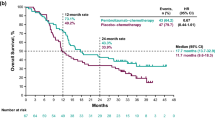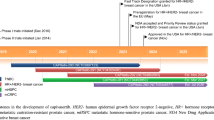Abstract
▴ Bevacizumab, a recombinant humanized monoclonal antibody directed against vascular endothelial growth factor, inhibits tumor angiogenesis and delays disease progression.
▴ Intravenous (IV) bevacizumab 5 mg/kg every 2 weeks, in combination with bolus irinotecan, fluorouracil and leucovorin (IFL), was administered as first-line therapy to patients with metastatic colorectal cancer in a large (n = 923), randomized, placebocontrolled, phase III trial.
▴ In this study, IFL plus bevacizumab significantly improved overall survival, progression-free survival, duration of response, and overall response rate compared with IFL plus placebo (p < 0.004 for each parameter).
▴ In combination with fluorouracil/leucovorin, IV bevacizumab 5 mg/kg every 2 weeks led to a significant increase in the median time to progression and response rate compared with fluorouracil/ leucovorin alone, in a randomized, phase II study (n = 104) of first-line therapy in a similar patient population (p < 0.029).
▴ Based on the available data, IV bevacizumab 5 mg/kg was generally well tolerated in patients with metastatic colorectal cancer. Hypertension was significantly more frequent in patients receiving bevacizumab in the phase III trial (p < 0.01). Bevacizumab was associated with a small increase in the incidence of gastrointestinal perforation and wound healing complications compared with comparators.




Similar content being viewed by others
Notes
The use of trade names is for product identification purposes only and does not imply endorsement.
References
Parkin DM. Global cancer statistics in the year 2000. Lancet Oncol 2001 Sep; 2(9): 533–43
Boyle P, Langman JS. ABC of colorectal cancer: epidemiology. BMJ 2000 Sep 30; 321(7264): 805–8
American Cancer Society. Cancer facts and figures 2004 [online]. Available from URL: http://www.cancer.org [Accessed 2004 May 14]
Jemal A, Murray T, Samuels A, et al. Cancer statistics, 2003. CA Cancer J Clin 2003 Jan/Feb; 53(1): 5–26
Scott L, Fraser J, Cassidy J. Emerging drugs in colorectal cancer. Expert Opin Emerging Drugs 2003; 8(1): 193–202
Clinical practice guidelines in oncology: colon cancer. Version 2.2003. USA: National Comprehensive Cancer Network, 2003 Mar 18
Clinical practice guidelines in oncology: rectal cancer. Version 3.2003. USA: National Comprehensive Cancer Network, 2003 Apr 23
Midgley R, Kerr D. Colorectal cancer. Lancet 1999 Jan 30; 353(9150): 391–9
Young A, Rea D. ABC of colorectal cancer: treatment of advanced disease. BMJ 2000 Nov 18; 321(7271): 1278–81
Manley PW, Martiny-Baron G, Schlaeppi J-M, et al. Therapies directed at vascular endothelial growth factor. Expert Opin Invest Drugs 2002 Dec; 11(12): 1715–36
Berlin JD. Targeting vascular endothelial growth factor in colorectal cancer. Oncology 2002 Aug; 16(8 Suppl. 7): 13–5
Lee J-C, Chow N-H, Wang S-T, et al. Prognostic value of vascular endothelial growth factor expression in colorectal cancer patients. Eur J Cancer 2000; 36(6): 748–53
Presta LG, Chen H, O’Connor SJ, et al. Humanization of an anti-vascular endothelial growth factor monoclonal antibody for the therapy of solid tumors and other disorders. Cancer Res 1997 Oct 15; 57(20): 4593–9
Kim KJ, Li B, Houck K, et al. The vascular endothelial growth factor proteins: identification of biologically relevant regions by neutralizing monoclonal antibodies. Growth Factors 1992; 7(1): 53–64
Kim KJ, Li B, Winer J, et al. Inhibition of vascular endothelial growth factor- induced angiogenesis suppresses tumor growth in vivo. Nature 1993 Apr 29; 362(6423): 841–4
Warren RS, Yuan H, Matli MR, et al. Regulation by vascular endothelial growth factor of human colon cancer tumorigenesis in a mouse model of experimental liver metastasis. J Clin Invest 1995 Apr; 95(4): 1789–97
Gerber H-P, Kowalski J, Sherman D, et al. Complete inhibition of rhabdomyosarcoma xenograft growth and neovascularization requires blockade of both tumor and host vascular endothelial growth factor. Cancer Res 2000 Nov 15; 60(22): 6253–8
Melnyk O, Zimmerman M, Kim KJ, et al. Neutralizing anti-vascular endothelial growth factor antibody inhibits further growth of established prostate cancer and metastases in a pre-clinical model. J Urol 1999 Mar; 161(3): 960–3
Borgström P, Hillan KJ, Sriramarao P, et al. Complete inhibition of angiogenesis and growth of microtumors by anti-vascular endothelial growth factor neutralizing antibody: novel concepts of angiostatic therapy from intravital videomicroscopy. Cancer Res 1996 Sep 1; 56(17): 4032–9
Melnyk O, Shuman MA, Kim KJ. Vascular endothelial growth factor promotes tumor dissemination by a mechanism distinct from its effect on primary tumor growth. Cancer Res 1996 Feb 15; 56(4): 921–4
Yuan F, Chien Y, Dellian M, et al. Time-dependent vascular regression and permeability changes in established human tumor xenografts induced by an anti-vascular endothelial growth factor/vascular permeability factor antibody. Proc Natl Acad Sci USA 1996 Dec; 93(25): 14765–70
Wildiers H, Guetens G, De Boeck G, et al. Effect of antivascular endothelial growth factor treatment on the intratumoral uptake of CPT-11. Br J Cancer 2003; 88(12): 1979–86
Lee C-G, Heijn M, di Tomaso E, et al. Anti-vascular endothelial growth factor treatment augments tumor radiation response under normoxic or hypoxic conditions. Cancer Res 2000 Oct 1; 60(19): 5565–70
Gordon MS, Margolin K, Talpaz M, et al. Phase I safety and pharmacokinetic study of recombinant human anti-vascular endothelial growth factor in patients with advanced cancer. J Clin Oncol 2001 Feb 1; 19(3): 843–50
Margolin K, Gordon MS, Holmgren E, et al. Phase Ib trial of intravenous recombinant humanized monoclonal antibody to vascular endothelial growth factor in combination with chemotherapy in patients with advanced cancer: pharmacologic and long-term safety data. J Clin Oncol 2001 Feb 1; 19(3): 851–6
Hsei V, DeGuzman GG, Nixon A, et al. Complexation of VEGF with bevacizumab decreases VEGF clearance in rats. Pharm Res 2002 Nov; 19(11): 1753–6
Gaudreault J, Lieberman G, Kabbinavar F, et al. Pharmacokinetics (PK) of bevacizumab (BV) in colorectal cancer (CRC) [abstract no. PI-98]. Clin Pharmacol Ther 2001 Feb; 69(2): P25
Genentech Inc. Avastin™ (bevacizumab) for intravenous use: prescribing information [online]. Available from URL: http://http://www.gene.com [Accessed 2004 Apr 1]
Hsei VC, Novotny WF, Margolin K, et al. Population pharmacokinetic (PK) analysis of bevacizumab (BV) in cancer subjects [abstract no. 272]. Proc Am Soc Clin Oncol 2001 May 12–15; 20 (Pt 1): 69
Data on file. Genentech Inc., 2004 Feb 13
Hsei V, Siguenza P, Gaudreault J. Effect of body weight on bevacizumab pharmacokinetics in cynomolgus monkeys and humans [abstract no. 1818]. Proc Am Soc Clin Oncol 2002 May 18; 21 (Pt 2): 3b
Kabbinavar F, Hurwitz HI, Fehrenbacher L, et al. Phase II, randomized trial comparing bevacizumab plus fluorouracil (FU)/leucovorin (LV) with FU/LV alone in patients with metastatic colorectal cancer. J Clin Oncol 2003 Jan 1; 21(1): 60–5
Hurwitz H, Fehrenbacher L, Novotny W, et al. Bevacizumab plus irinotecan, fluorouracil, and leucovorin for the treatment of metastatic colorectal cancer. N Engl J Med 2004 Jun 3; 350(23): 2335–42
Hurwitz H, Fehrenbacher L, Hainsworth J, et al. Bevacizumab (Avastin™) in combination with 5-fluorouracil and leucovorin: a promising regimen for first- line metastatic colorectal cancer [abstract no. 286]. Gastrointestinal Cancers Symposium 2004 [online]. Available from URL: http://http://www.asco.org [Accessed 2004 Feb 19]. Plus poster presented at the Gastrointestinal Cancers Symposium 2004 Jan 22–24; San Francisco
National Cancer Institute. Phase III randomized study of bevacizumab (rhuMAb VEGF) with fluorouracil and leucovorin calcium with or without irinotecan in patients with metastatic colorectal cancer [online]. Available from URL: http://http://www.cancer.gov/clinicaltrials [Accessed 2003 Nov 13]
Scappaticci F, Fehrenbacher L, Cartwright T, et al. Analysis of wound healing and bleeding post-surgery in metastatic colorectal cancer patients treated with bevacizumab [abstract no. 235]. Gastrointestinal Cancers Symposium 2004 [online]. Available from URL: http://http://www.asco.org [Accessed 2004 Feb 19]. Plus poster presented at the Gastrointestinal Cancers Symposium 2004 Feb 22–24; San Francisco
Giantonio BJ, Levy D, O’Dwyer PJ, et al. Bevacizumab (anti-VEGF) plus IFL (irinotecan, fluorouracil, leucovorin) as front-line therapy for advanced colorectal cancer (advCRC): updated results from the Eastern Cooperative Oncology Group (ECOG) study E2200 [abstract no. 289]. Gastrointestinal Cancers Symposium 2004 Jan 22–24; San Francisco [online]. Available from URL:http://http://www.asco.org [Accessed 2004 Feb 19]
Giantonio BJ, Catalano PJ, Meropol NJ, et al. The addition of bevacizumab (anti- VEGF) to FOLFOX4 in previously treated advanced colorectal cancer (advCRC): an updated interim toxicity analysis of the Eastern Cooperative Oncology Group (ECOG) study E3200 [abstract no. 241]. Gastrointestinal Cancers Symposium 2004 Jan 22–24; San Francisco [online]. Available from URL:http://http://www.asco.org [Accessed 2004 Feb 19]
National Cancer Institute. Phase II randomized study of fluorouracil and leucovorin calcium with or without bevacizumab in patients with previously untreated metastatic colorectal cancer who are not optimal candidates for first- line irinotecan [online]. Available from URL: http://http://www.cancer.gov/clinical-trials [Accessed 2003 Nov 13]
National Cancer Institute. Phase III randomized study of fluorouracil, leucovorin calcium, and oxaliplatin versus capecitabine and oxaliplatin with or without bevacizumab in patients with locally advanced, metastatic, or recurrent colorectal cancer [online]. Available from URL: http://http://www.cancer.gov/clini-caltrials [Accessed 2003 Nov 13]
Genentech Inc. Genentech receives FDA fast-track designation for Avastin 2003 Jun 26 [online]. Available from URL: http://http://www.gene.com [Accessed 2003 Jun 26]
Author information
Authors and Affiliations
Corresponding author
Rights and permissions
About this article
Cite this article
Croom, K.F., Foster, R.H. Bevacizumab. Am J Cancer 3, 187–194 (2004). https://doi.org/10.2165/00024669-200403030-00005
Published:
Issue Date:
DOI: https://doi.org/10.2165/00024669-200403030-00005




